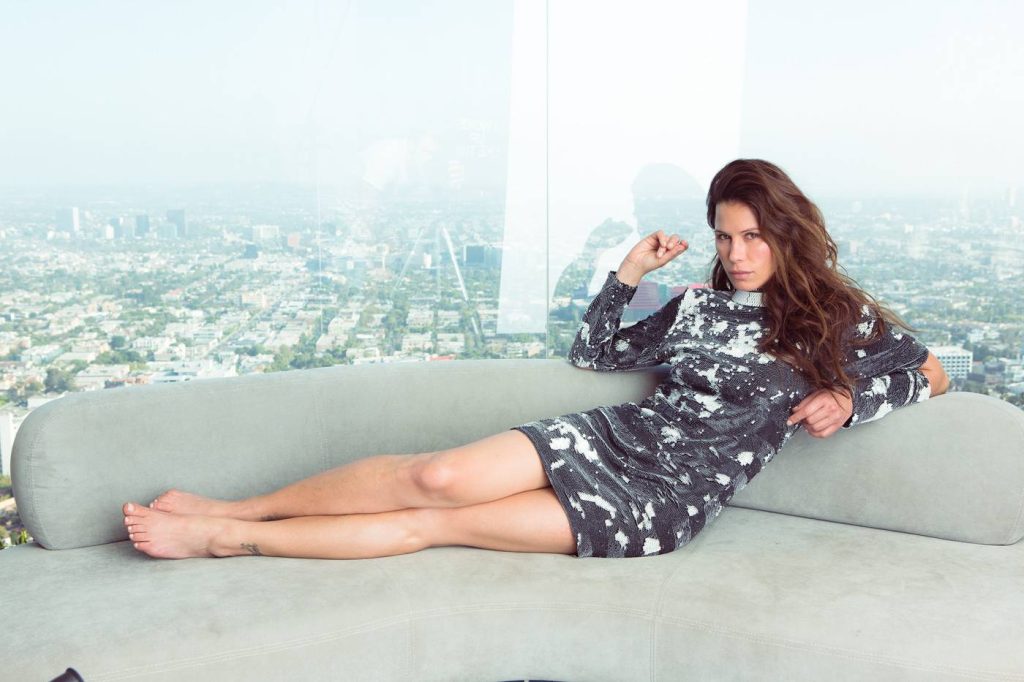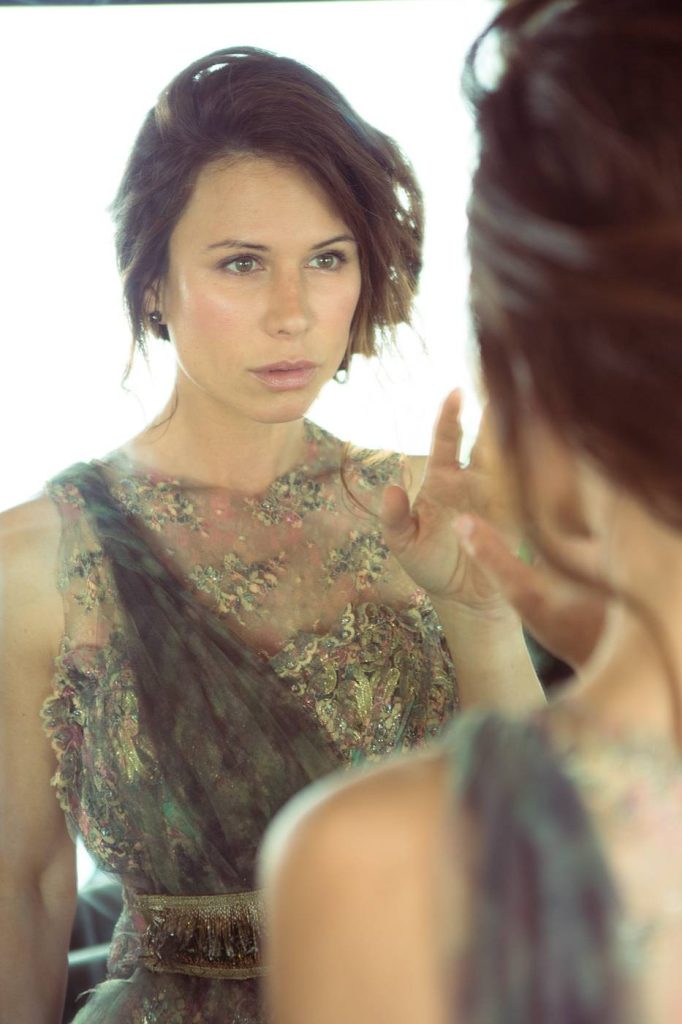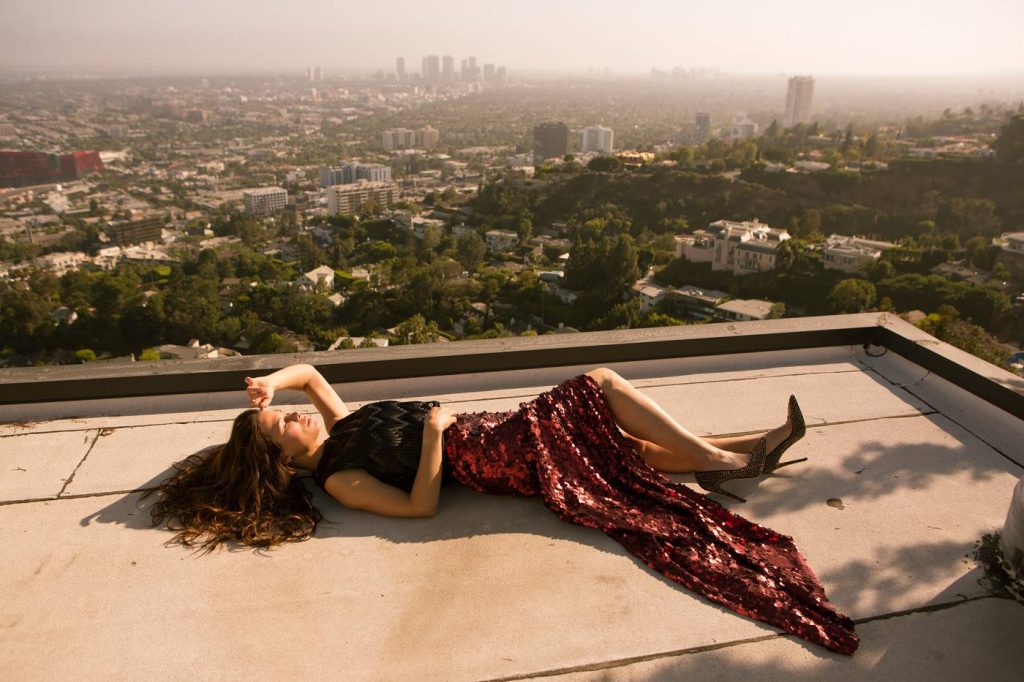
by Frances Rossini
photography by Stephen Busken
A woman for video game fantasists, comic book connoisseurs and graphic artists — her most avid fans may know her as the original model behind Lara Croft, as a regular guest at Comic Con junkets, or as a fellow fan of graphic art novels and their darker nature in general. However associated, Rhona Mitra proves to be as intellectually curious in complex interests as the various past roles she’s portrayed.
We caught up with Rhona when she was visiting the west country of England, a more rural part that had just experienced serious loads of flooding. She prefaces the conversation with, “I just walked in from a very muddy, wet walk through fields. We’re actually monitoring cow activity, if that gives you an idea of how removed from your world I am. I may sound a tad bit discombobulated, but I’m sort of down the rabbit hole, so to speak.”
Having spent the better part of the last year and a half filming her new show, The Last Ship, in California during a major drought, the flooding in England seems to her the antithesis. It proves that global warming is no longer a sanctioned conspiracy theory. Rather, it’s a piece of literature offering conspiracies of what could happen — this is a present-day dilemma that we’re all seeing first hand. As far as civilization making changes to prevent further damage, Rhona says, “we’re a tenacious bunch, human beings, and hopefully we’ll get the memo.”
Beyond musing a current issue like ‘global warming,’ Rhona often ruminates more on the philosophy of human fault and the depths of existence. She is more about abstraction than blatant truth, and finds comfort in exploring these. One way she explores the intricacies of human nature is with great musical compositions of the past. “You find that classical music is very dark and very heavy…They lean towards melancholy and shadows, and they tend to strike a chord with us as human beings because we can relate and empathize with it.” It’s always more intriguing to explore the shadows rather than be afraid of them, Rhona points out. “You can’t just play chopsticks your whole life, or Gershwin. You have to explore the lower notes so you can take more light in the high stuff when it happens.”

“I find that a lot of Europeans find not humor, but a lot of healing and lot of light to be discovered when you uncover the darker stuff. I find it cathartic to go in there and explore, and ultimately you learn so much about yourself.”
She believes that mainstream culture is coming back around to embrace these more exploratory themes. After the 60s revolution from the facade-perfecting, pretentious decades that came before, everyone, “just got really kind of radical, but no one had an idea of who we were as a race because we were lying to ourselves for so long. So we’re in this sort of birth and blossoming, kind of going back to the roots of our forefathers and playwrights who celebrate flaw and character, and realizing it’s not actually flaw but actually part of our truth.”
If you look at the history of her roles and projects, they noticeably trend towards this darker realm of interest rather than lighthearted rom-coms or scripts packed with cheesy one-liners. But Rhona says there’s no deliberate connection — she may just have a natural bent for a bluer subject and she’s quite warm in it, “I don’t seek it out; it just finds me.” As a working actor, who has had the opportunity to have jobs come her way, she just tries to do her best and be consistent. She explains, “Just like you, you pick up your meal ticket and you run with it. Some jobs are just jobs, but others can be something really truthful.”
When asked about the depth and toll of her role in the thriller, The Loft, she says that the mood on set was ‘fantastically light.’ Rhona learned long ago not to be so entrenched in roles like these. She has learned from her youth to not be so method-y, and to know when to step out of character.
“When I was younger I didn’t understand that there’s a balance you need to employ that’s about 70% of your role and 30% of yourself, or else you sort of lose yourself. We are such sensitive creatures that our wiring is very much like a machine: if you repeat behavior and emotional responses again and again of fear and anxiety, you become quite unhinged.”

Good to know she’s not genuinely feeling like the world’s on her shoulders, then, for her latest role. in the show, The Last Ship. In the show, which premiered June 22 on TNT, Rhona plays a vital character who’s responsible for finding the cure to save the human race. With a global pandemic that strikes 80% of the world’s population, it’s a post-apocalyptic drama set on a Naval ship and co-starring Eric Dane and Adam Baldwin. Although while in character she is searching for a vaccine to save the human species, she says the show isn’t, “only dealing with something that’s very poignant-themed. I think that the conversation and debate that follows is not just one about television and the Navy and blowing things up and U.S. vs the Russians, that it’s [also] about what’s happening to us as a human race and what warfare we’re dealing with on a ground level.”
It’s not exactly her role on the show transcending to real life, but that she does see the show as offering insight to a grave reality our world is facing. Rhona recognizes how her role seems to resonate with the current hot-button issue of vaccinations and the debated belief that vaccines lead to autoimmune deficiencies or cause autism and multiple sclerosis. In the show’s setting, she seeks vaccines that do not contain preservatives like mercury or a myriad of other things that cause illness among human beings. The pursuit of truth, health, and improvement is a driving factor, just as it is in reality “And that’s what I’ve learned over the last couple of years, that it’s much graver and more complex than I think people are willing to accept right now. It’ll all be unveiled, though.”
In the wake of an apocalypse, “the importance is what the individual does. Governments are going to do what governments are going to do and they always have. It’s what the individuals do when they come together [that is important]. Hopefully, we’ll selectively prevail. Or not.”
